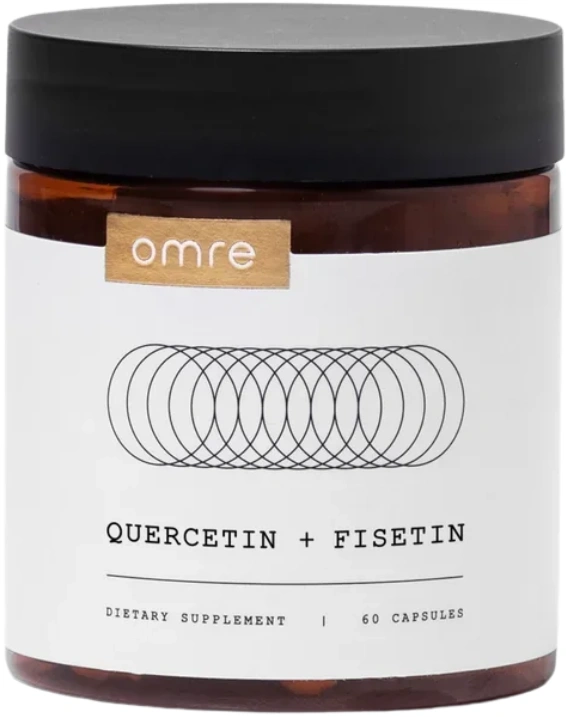Table of Contents
Fisetin is a plant-based compound that has gained attention for its possible role in healthy aging and cell support.
Found naturally in foods like strawberries and apples, it is being studied for how it interacts with aging cells, inflammation, and oxidative stress.
Research is still developing, but early findings help explain why fisetin is often discussed in longevity-focused conversations.
Disclaimer: This content is for educational purposes only and is not intended as medical advice. Always consult a qualified healthcare professional before starting any dietary supplement.
Quercetin and Fisetin help manage 'zombie' senescent cell burden and support cellular rejuvenation.*Quercetin + Fisetin
What Is Fisetin?
 Fisetin is a natural flavonoid found in certain fruits and vegetables that has antioxidant and cell-supporting properties.
Fisetin is a natural flavonoid found in certain fruits and vegetables that has antioxidant and cell-supporting properties.
It belongs to a group of plant compounds called polyphenols, which plants use to protect themselves from stress (1). In the human body, these compounds interact with basic cellular processes related to aging and inflammation.
Fisetin is present in foods such as strawberries, apples, persimmons, onions, and lotus root. Among these, strawberries contain the highest known dietary levels. Still, the amounts from food are relatively small compared to what is used in most research settings.
Scientists study fisetin because it appears to influence how cells respond to oxidative stress, inflammation, and cellular aging.
Much of the current evidence comes from lab and animal studies, which helps explain mechanisms but does not yet confirm the same effects in humans.
How Fisetin Works in the Body
Fisetin interacts with cells through several well-studied biological pathways linked to aging and inflammation. Rather than acting as a stimulant or medication, it supports normal cellular processes that decline with age.
At a basic level, fisetin helps cells manage stress and maintain balance. Research suggests it influences how cells respond to damage and how the body clears cells that no longer function properly.
Key actions studied include:
Fisetin supports the body’s antioxidant pathways involved in managing cellular oxidative stress.
Fisetin influences inflammatory signaling pathways involved in aging.
Fisetin interacts with pathways related to cell survival and cell removal.
These actions are studied mostly in controlled lab settings, which helps researchers understand how fisetin behaves at the cellular level.
Potential Fisetin Benefits Backed by Research
 Research on fisetin focuses on how it affects aging-related processes rather than treating specific diseases. Below are the most studied areas, with careful attention to what the evidence actually shows.
Research on fisetin focuses on how it affects aging-related processes rather than treating specific diseases. Below are the most studied areas, with careful attention to what the evidence actually shows.
Senolytic Activity and Aging Cells
Senescent cells are older or damaged cells that stop dividing but do not leave the body. These cells can release inflammatory signals that affect nearby healthy tissue. Accumulation of senescent cells is considered one factor associated with aging.
Fisetin has been identified as a senolytic compound in laboratory and animal studies (2). This means fisetin helps reduce the number of senescent cells by promoting their removal.
Fisetin reduced senescent cell burden in multiple tissues, which researchers associated with changes in tissue function and inflammatory signalling pathways in animal models (3).
Longevity and Healthspan Findings
Lifespan refers to how long an organism lives. Healthspan refers to how well it functions during that time. These are studied separately in aging research.
In a well-known study conducted by researchers affiliated with the Mayo Clinic, aged mice given fisetin lived longer than untreated mice.
The increase was about 10%, and the mice also showed better physical function during aging. Importantly, fisetin was effective even when given later in life (4).
This research suggests fisetin influences aging mechanisms in animals, not that it extends human lifespan. Human clinical trials on longevity outcomes are still limited.
Brain and Nerve Cell Protection
Some research explores fisetin in the context of neural tissue because nerve cells have high energy demands and are sensitive to oxidative stress.
Laboratory studies suggest fisetin supports cellular energy balance in neural cells and helps reduce oxidative stress-related damage (5). These effects are linked to basic cell protection rather than improvements in memory or cognition.
Most findings come from animal and cell-based models, and they help researchers understand how fisetin interacts with high-energy tissues under stress conditions.
Heart and Metabolic Support
Metabolic and cardiovascular studies on fisetin focus on inflammation, oxidative stress, and blood vessel function.
Animal studies suggest fisetin may support normal blood sugar regulation and reduce inflammation in blood vessels under stress (6). In these models, fisetin helped protect vascular tissue from damage linked to inflammatory responses.
These findings support further research but do not establish fisetin as a treatment for metabolic or heart conditions. Human evidence remains limited and exploratory.
Fisetin and Inflammation-Related Conditions
Research on fisetin includes early studies on how it interacts with inflammation in skin, immune tissue, and other body systems. These findings come mainly from laboratory and animal models, not from large human clinical trials.
Preclinical studies suggest fisetin may help regulate inflammatory signaling and reduce markers linked to tissue irritation and immune overactivity.
For example, animal studies have explored fisetin’s role in skin inflammation models and immune cell activity, where it appeared to lower the presence of inflammatory cells and signaling molecules (7).
These results help researchers understand potential mechanisms, but they do not confirm benefits for treating inflammatory conditions in people.
Human evidence remains limited and exploratory.
Dietary Sources of Fisetin
Fisetin is naturally present in a small number of fruits and vegetables, with overall dietary intake remaining relatively low.
Common food sources include:
Strawberries, which contain the highest known dietary levels.
Apples and persimmons in smaller amounts.
Onions and lotus root in trace quantities.
Because food-based amounts are modest and vary by season and preparation, dietary intake alone may not reach levels commonly used in research settings.
Quercetin + Fisetin
Quercetin and Fisetin help manage 'zombie' senescent cell burden and support cellular rejuvenation.*
Possible Side Effects of Fisetin
Fisetin is generally well-tolerated in research settings, but some people may experience mild side effects, especially at higher doses.
Most safety information comes from animal studies and small human trials, so long-term effects are still being studied.
Reported and potential side effects include:
Mild digestive discomfort such as nausea, bloating, or loose stools.
Headache or fatigue in some individuals when taken in larger amounts.
Possible interactions with medications that are processed by liver enzymes.
Rare allergic reactions, such as itching or skin irritation.
Taking fisetin with food may help reduce stomach-related symptoms. If you are pregnant, breastfeeding, managing a health condition, or taking prescription medication, it is wise to speak with a healthcare professional before use.
How to Take Fisetin
-v1766696798028.webp) Fisetin is best taken with food that contains healthy fats to support absorption. It is a fat-soluble compound, which means the body absorbs it more efficiently when consumed alongside dietary fat.
Fisetin is best taken with food that contains healthy fats to support absorption. It is a fat-soluble compound, which means the body absorbs it more efficiently when consumed alongside dietary fat.
Many people take a fisetin supplement once daily with a meal such as breakfast or lunch. Research-based dosing varies widely, and there is no established standard dose for general use.
Some studies explore daily low doses, while others use short-term higher dosing protocols under controlled conditions.
Because fisetin is metabolized relatively quickly, some users choose intermittent use rather than continuous daily intake. There is no single approach that fits everyone, and human research on long-term use patterns is still limited.
Starting with a lower amount and observing how your body responds is a common, cautious approach.
Fisetin vs Other Flavonoids
Fisetin is one of several flavonoids studied for antioxidant and cell-supporting activity, but it stands out for its senolytic research interest.
While many flavonoids help manage oxidative stress, fisetin has drawn attention for how it interacts with aging cells in preclinical studies.
Fisetin vs Quercetin
Fisetin and quercetin are both plant-based flavonoids found in fruits and vegetables. They share antioxidant and anti-inflammatory properties, but they are studied for slightly different reasons.
Quercetin is widely researched for immune response, oxidative stress, and vascular health. Fisetin is studied more often in aging research because of its senolytic activity in animal models.
Both compounds influence inflammatory pathways and cellular stress responses, though they appear to act on different molecular targets.
Some supplements combine fisetin and quercetin because their mechanisms may complement each other. Research suggests they may work on overlapping but distinct pathways related to oxidative stress and cell signaling.
Combination studies are still early and mostly limited to lab and animal research.
Combined Benefits of Quercetin and Fisetin
When studied together, quercetin and fisetin show signs of complementary activity in preclinical research. Scientists explore these combinations to better understand how multiple flavonoids interact within complex biological systems.
Research findings suggest potential combined effects, such as:
Antioxidant and inflammatory support: Studies indicate stronger reductions in oxidative stress markers when both compounds are present compared to either alone (8).
Nerve pain research support: Early animal research suggests quercetin and fisetin may influence pathways related to neuropathic pain response when studied alongside medications such as pregabalin (9).
Antiviral laboratory findings: Some studies show combined activity against viral replication and inflammation in models such as dengue virus (10).
These findings help guide future research but do not establish confirmed health outcomes in humans.
Final Words
Fisetin is a naturally occurring flavonoid that has drawn research interest for its role in oxidative stress, inflammation, and aging-related cellular processes.
Laboratory and animal studies suggest it may help reduce senescent cell burden, support cellular balance, and influence pathways linked to healthy aging. At the same time, most findings are still early, and human evidence remains limited.
Dietary sources like strawberries provide small amounts of fisetin, while supplements offer a more concentrated option for those interested in its research-backed properties. As with any supplement, a thoughtful and informed approach matters.
At Omre, we focus on evidence-led formulations that respect both the science and the limits of current research. Our Quercetin + Fisetin supplement is designed to support cellular health using carefully selected ingredients and transparent sourcing.
If you are exploring flavonoids as part of a wellness routine, we aim to offer options you can trust, grounded in research and reviewed with care. Learn more about our Quercetin + Fisetin formula and how it fits into a thoughtful, research-informed approach to cellular health.
Learn more about our Quercetin + Fisetin formula and how it fits into a thoughtful, research-informed approach to cellular health.





